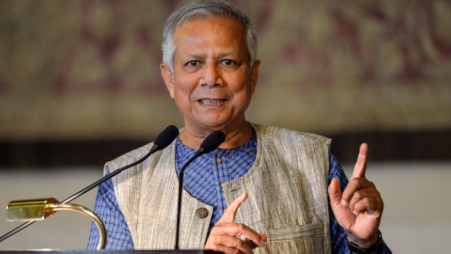
Yunus
Ousted prime minister Sheikh Hasina’s regime was not a government, rather, it was a family of bandits, Chief Adviser Prof Muhammad Yunus has said
Nobel laureate and current leader of Bangladesh’s interim government, Muhammad Yunus, has strongly criticized former Prime Minister Sheikh Hasina’s administration, calling it a “family of bandits” in an interview with The Guardian.Yunus, who took charge of the country after Hasina was ousted in 2024 following mass protests, accused her government of widespread corruption, human rights abuses, and the suppression of opposition voices. “For years, the people of Bangladesh suffered under a government that functioned more like a private enterprise for one family rather than a democratic institution,” he stated.
A History of Tension
The conflict between Yunus and Hasina goes back over a decade. The former prime minister had repeatedly targeted Yunus, accusing him of financial misconduct and removing him from his role at Grameen Bank. Many critics saw these actions as politically motivated, considering Yunus’ global reputation as a champion of microfinance.
However, Hasina’s government faced increasing backlash in recent years over allegations of election rigging, media censorship, and police brutality against protesters. The situation reached a boiling point in early 2024 when nationwide student-led demonstrations called for her resignation.
Interim Government’s Reforms
Since taking office, Yunus’ interim government has launched several initiatives to dismantle what he calls Hasina’s “legacy of corruption.” Key reforms include:
– Establishing an anti-corruption commission to investigate financial crimes under the previous regime.
– Restoring press freedom and releasing political prisoners.
– Organizing new democratic elections scheduled for late 2025.
“We are committed to ensuring that Bangladesh never returns to the days of autocracy,” Yunus assured during the interview.
The Road Ahead
Despite his strong words against Hasina, Yunus faces challenges in stabilizing the country. Political divisions remain deep, and former members of Hasina’s party, the Awami League, continue to push back against his reforms. Moreover, international stakeholders, including India and China, are closely monitoring Bangladesh’s political shifts.
As the country prepares for fresh elections, the question remains: Will Yunus succeed in his mission to rebuild Bangladesh’s democracy, or will old political rivalries continue to dominate the nation’s future?

Dr. Muhammad Yunus will make Bangladesh great if Bangladeshi people wants.